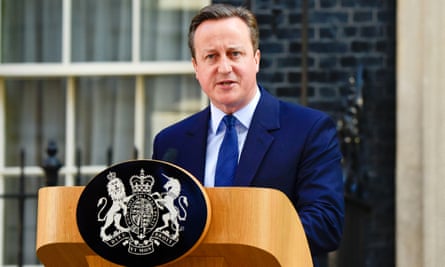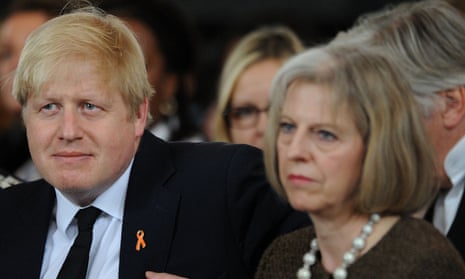Britain will have a new prime minister by 2 September, after the executive of the Conservative party’s backbench 1922 Committee set a tighter than expected timetable for selecting a new leader.
David Cameron announced last Friday that he would step down following the historic EU referendum result, paving the way for a new prime minister to be appointed by the time of the party’s conference in October.
But the 1922 executive, chaired by the MP Graham Brady, which met on Monday lunchtime, said it would recommend a more rapid process. “Things are in our hands, and we are moving as quickly as possible,” said Brady. “We think that the party and the country want certainty.”
He added that if a new prime minister presses ahead with the crucial renegotiations, they could then call a general election to allow the public to give their verdict on Britain’s new relationship with the EU.
“We have just been given a very clear steer, direction by the people of Britain ... we have a big complicated task to accomplish,” he told Sky News. “I think it is entirely reasonable to expect that the government should embark on that, get on with that, seek to negotiate as good an outcome as we can before the people then are asked to approve or reject that in a general election.”
Nominations for the Conservative leadership will open on Wednesday evening, and close on Thursday; and the final result will be declared by 2 September.
If there are more than two candidates, Conservative MPs will hold rounds of voting, the first of which will be on 5 July, with the least popular hopeful being eliminated each time. The party’s members will then be given a choice – almost certainly of two contenders.

Leading Brexit campaigner Boris Johnson and the home secretary, Theresa May, are seen as the frontrunners, though a number of others – including the work and pensions secretary, Stephen Crabb, the energy secretary, Amber Rudd, and the education secretary, Nicky Morgan – are also seen as likely to run.
Some pro-remain backbench MPs believe the fast timetable may favour Johnson, who has already begun assembling a team of supporters, though he has not yet officially declared his candidacy.
May is widely expected to announce herself as a candidate this week and is likely to be backed by a significant number of MPs as the “stop Boris” choice.
One of the arguments being used to tempt Tory backbenchers to support her is that there would be less need to hold a general election. This is because she was in a significant position in government when the Conservatives stood on their manifesto at the last election and would therefore be better able to argue for carrying on with the same mandate.
In contrast, Johnson was not in government then, which would put more pressure him to seek his own mandate.
Johnson, the former London mayor, arrived with a huge entourage at Portcullis House on Monday after spending the weekend holed up with allies at his country home. Earlier, he had set out his thoughts about life after Brexit in his Telegraph column, claiming the UK would be able to introduce a points-based immigration system while maintaining access to the European single market. This is not an offer on the table from the EU at the moment.
Some pro-remain Conservative MPs who watched Johnson arrive said they would do everything they could to stop to him taking over as leader of the party. One MP said they had been taken aback by the level of antipathy towards Johnson and predicted May would end up emerging as his main challenger. Morgan, Rudd and Crabb may simply be putting down markers that they want significant jobs.
May is likely to pitch herself as the unity candidate, as she backed the campaign to remain but stayed above the day-to-day fray and burnished her Eurosceptic credentials by backing a withdrawal from the European convention on human rights.
And there are concerns even among pro-Brexit MPs about whether Johnson is the best person to carry out the complex negotiations that would be necessary to extricate Britain from the EU.
But one backbench supporter said Johnson had shown his mettle as a “supremely successful” mayor, delivering the London Olympics on time and on budget. He said Johnson would spend the coming days “taking soundings” from Conservative MPs. “He’s thinking long and hard about whether or not to stand,” the source said.
Both the Johnson camp and allies of the chancellor denied reports that George Osborne, who fought hard for the remain campaign, could swing his weight behind the former mayor. But the chancellor made clear at his statement on Monday that he hoped to play some role in guiding Britain through the difficult Brexit negotiations.
Ryan Shorthouse, of liberal Conservative thinktank Bright Blue, said most likely candidates would continue the prime minister’s legacy – on social reform, for example – and the sharpest divide in the coming contest would be about how the next Tory leader would handle Brexit negotiations. “A large part of the leadership battle will be fought over what kind of relationship we will have with the EU,” he said.
One Tory MP, who supported the remain campaign, claimed “the liars had won the day” on the referendum. But they argued that when the electorate realised that they couldn’t have everything they’d been promised they wouldn’t want “the liar in chief”. The MP talked to colleagues about his determination to block a Johnson coronation. Another MP agreed, saying that although they would describe themselves as a moderniser who would not have expected to back May, she was the best hope of stopping Johnson.
